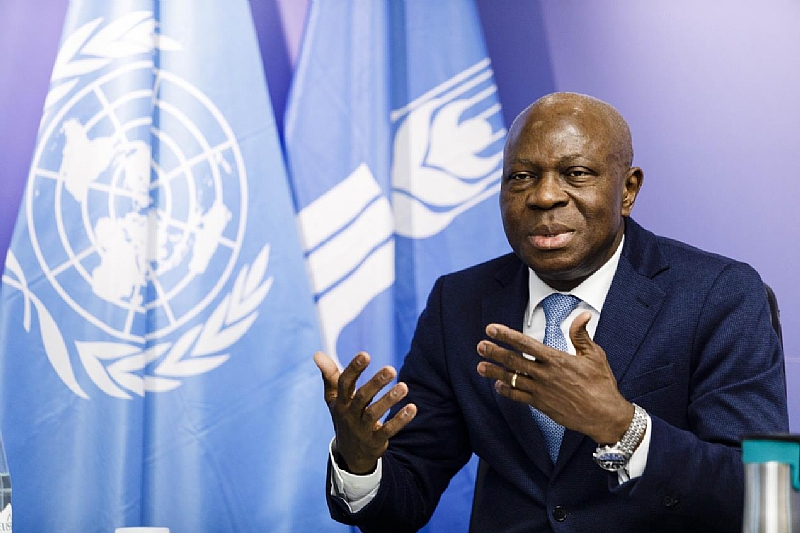
[ad_1]
$ 3.8 billion is the amount that the United Nations International Fund for Agricultural Development (IFAD) will now be able to invest in the world’s rural poor. This is thanks to an unprecedented record funding target set today by the governments of 177 countries at IFAD’s annual Governing Council.
At a time when many countries face serious economic challenges, this decision demonstrates the importance that world leaders place on investing in effective long-term rural development, which is essential to achieve the Sustainable Development Goals. This strong vote of confidence significantly strengthens IFAD’s ability to cope with the devastating socio-economic effects of COVID-19 and climate change. With this unprecedented funding, IFAD will reach an estimated 140 million people in the world’s most fragile and remote regions over three years.
Coupled with an expansion of IFAD’s Pioneering Climate Change Adaptation Program (ASAP +), a new private sector financing program, and co-financing from national and international partners, IFAD aims to deliver a comprehensive program of work of ” at least $ 11 billion between 2022 and 2024.
“Today our Member States made it clear that the plight of the poor and hungry is important. We are all united in our fight against the effects of COVID-19 and a rapidly changing climate – but none are feeling the impacts more profoundly than the rural populations of the world’s poorest countries, ”said Gilbert F. Houngbo , President of IFAD.
“It costs less to invest in sustainability and build long-term resilience to shocks than to respond to repeated humanitarian emergencies. This is why the Sustainable Development Goals exist, and this increased commitment to IFAD is an important step in their achievement. The contributions announced so far show our Member States are committed to eradicating poverty and hunger, and are confident in the impact of IFAD’s work, ”Houngbo added.
Already, 67 countries have announced new pledges totaling more than $ 1.1 billion in support of IFAD’s Twelfth Replenishment (IFAD12), a process by which Member States set strategic priorities and initiate funds for the organization for its work in 2022-2024. Other commitments are expected throughout 2021.
In a strong show of support, the governments of Germany and France issued a joint statement which read: “Given that IFAD12 is both ambitious and necessary to tackle rural poverty at this critical time, the German government and the French government both decided to significantly increase their financial support to IFAD to an all-time high. We urge all Member States to join us in making an ambitious contribution. ”
IFAD is unique among international financial institutions in the large number of Member States – typically over 100 – that voluntarily contribute to its core funding. This includes some of the world’s poorest countries, which were among the first to announce significantly increased pledges last year, highlighting the value they place on their partnership with IFAD and putting pressure on traditional donors. so that they mobilize.
Many of IFAD’s major donors have announced their intention to contribute significantly more than their previous funding. The United States, historically IFAD’s largest donor, has committed $ 129 million, a 43% increase from its previous level of funding. A statement issued by the country underscored IFAD’s role as “an effective partner in bringing donors together in a multilateral framework to have an impact on the rural poverty of the poorest.”
Increased pledges were also announced by France ($ 106 million – 50% more), Italy ($ 96 million – 45% more), Sweden ($ 87.3 million – i.e. 60% additional in Swedish kronor) and Ireland (14.3 dollars). million, or 66 percent more), among others. Finland and Norway also increased their base commitments by 40% in national currency, and Germany, China, the Netherlands, Japan and Canada made significant contributions of $ 101 million, $ 85 million $ 82.9 million, $ 57.3 million and $ 55.5 million respectively.
Other countries including Cambodia, Lao People’s Democratic Republic, Madagascar, Mauritania, Pakistan and the Philippines have also pledged higher contributions, joining those pledged to significant increases last year, notably Burkina Faso, Côte d’Ivoire, Gambia, Greece, Luxembourg, Mali, São Tomé and Principe, Sierra Leone and Uganda. Contributing for the first time since 2013, Haiti announced a commitment of more than double its last contribution, while Somalia announced its first commitment in three decades.
As part of the IFAD12 process, Member States agreed to finance a reformed debt sustainability framework to ensure that indebted countries can continue to receive grants from IFAD.
In addition, they agreed that at least half of the funding received will support rural development projects in sub-Saharan Africa and that more than a quarter will be channeled to countries facing conflict or other fragile situations.
At least 40% will be invested in tackling climate challenges, helping to achieve the Paris Agreement and ensuring that more climate finance reaches small farmers. Investing in young people and creating rural jobs will also be a key priority.
IFAD’s people-centered approach to rural development promotes “bottom-up growth” through community-level investments in small and medium-sized enterprises, small producers and the rural non-farm economy. These local investments have been proven to promote prosperity, food security and resilience to extreme climate change, natural disasters, price hikes and other shocks like the COVID-19 pandemic which can later lead to humanitarian crises.
From 2022, IFAD will implement a strengthened business model that incorporates lessons learned from the COVID-19 pandemic to ensure that IFAD investments help rural people sustain progress and rebuild communities. stronger and more resilient livelihoods from this and other future shocks.
Source link